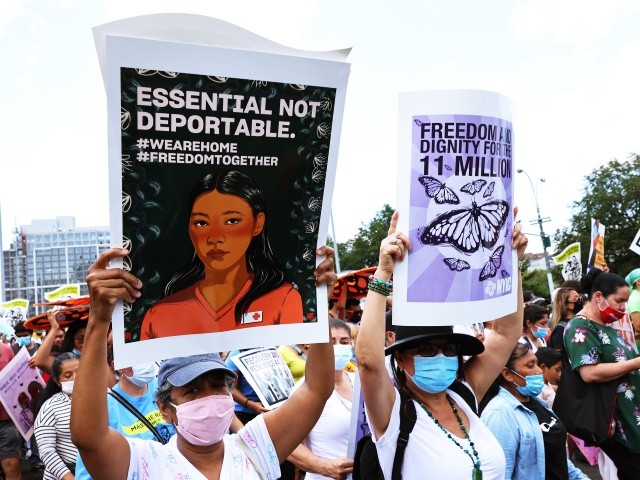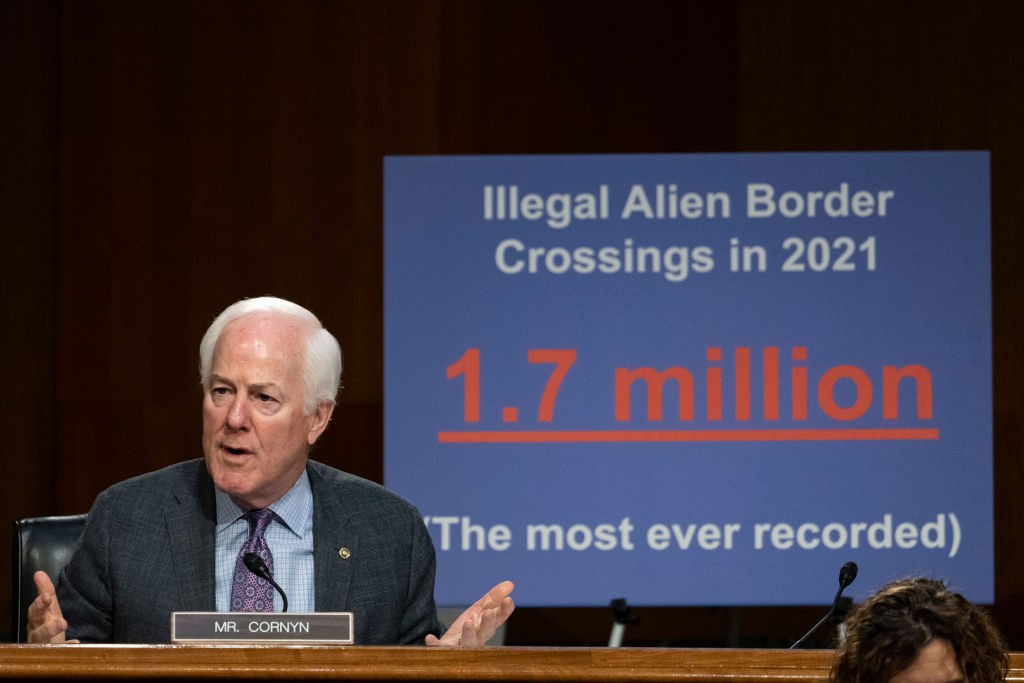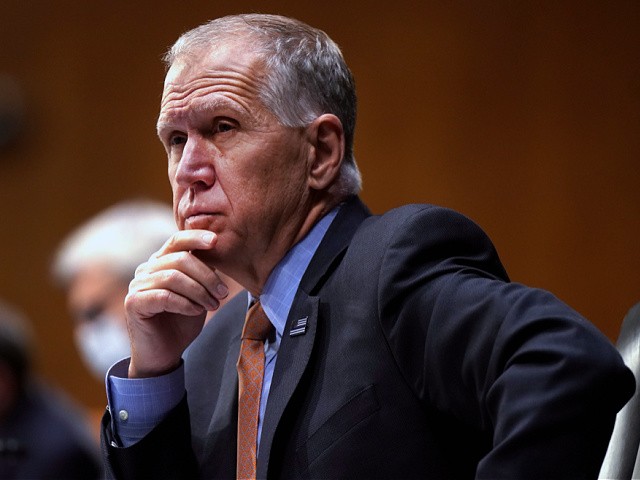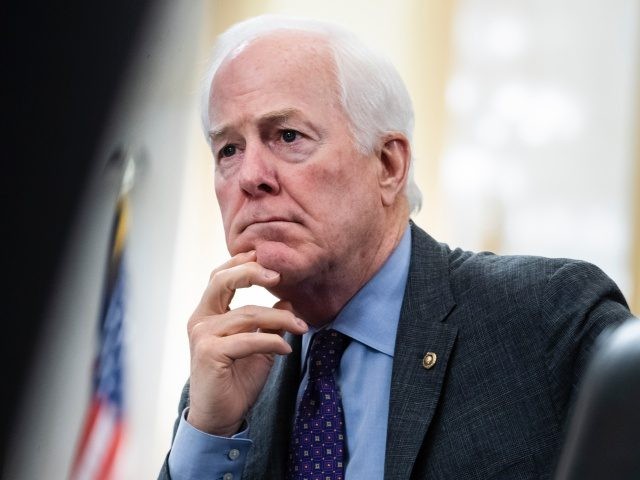Texas GOP Sen. John Cornyn and various other senators said nothing in defense of young American men and women when university lobbies used a June 14 hearing to request more foreign students that will take white-collar jobs sought by young Americans.
“There are over a million fewer U.S. domestic students enrolled in college than there were just three years ago … [and] compared to five years ago, international student enrollment has declined by 21 percent,” Bernard Burrola, a vice president at the Association of Public and Land-Grant Universities, told a Senate hearing on June 14.
Millions of foreign students have enrolled in U.S. universities because a White House policy set by President George W. Bush allows them to get “Optional Practical Training” work permits for the rising jobs needed by American graduates.
The foreign students are a bonanza for the universities and their local economies, Burrola told Cornyn and Sen. Alex Padilla (D-CA), the chairman of the Senate’s subcommittee on immigration and border safety:
They generate huge economic activity in our communities. International students contributed this past year over $30 billion through paying tuition rent and living expenses … Imagine where we could be if we made attracting and retaining global talent a centerpiece of our U.S. economic and foreign policy strategy.
Cornyn has a long history of quietly backing legalized labor migration into the jobs needed by white-collar and blue-collar Americans, even as he also publicly votes against obvious amnesties for illegal migrants.

People participate in a march in support of a pathway to citizenship for immigrants on July 23, 2021, in New York City. (Photo by Michael M. Santiago/Getty Images)
“I’ve long been a supporter of employment-based immigration,” Cornyn told a June 14 hearing:
It doesn’t matter where you’re from or where you live, if you have skills that can contribute to our economy and our country, our employment-based immigration program provides a path for you to come to the United States legally.
Cornyn continued:
And our immigration system is struggling to keep pace. Per-country caps have artificially limited access to employment-based visas for prospective immigrants from countries like India, preventing workers who want to contribute to our economy for being able to do. And our existing guest [worker] programs need to be updated to meet today’s challenges …
Today’s hearing is focused on one potential source of highly trained workers who could contribute to our economy: Individuals who come to study at our universities and other educational institutions on F, J and a M visa … Every year, more than 200,000 new highly skilled students temporarily join our workforce through the Optional Practical Training program, outstripping the number of permanent [U.S.] positions available to them when they finish this program. I look forward to hearing about the proposals that would allow us to harness these [foreign] students’ skills in the longer term.
“He’s certainly being responsive to the business interests,” said Steven Camarota, the research director at the Center for Immigration Studies. “But it’s not clear if he will act on it because it’s the kind of thing that’s popular with the Chamber of Commerce, but not with actual voters,” he told Breitbart News.
“He says he’s against amnesty, while at the same time he’s working with Indian outsourcing companies to increase the number of [white collar] employment visa holders coming to the country,” said Kevin Lynn, founder of U.S. Tech Workers. Senators “know that this practice leads to the displacement of American white-collar professionals, yet they will do nothing to stop it — [yet Cornyn] appears to be a hawk on immigration because he also takes stands against amnesty.”
The visa worker programs are unpopular among the swing-voting white-collar Americans who work in the professional sector, said a 2014 study by academics at Stanford University: “Using a targeted, web-based survey of respondents in high-technology counties, that research finds that native workers employed in the high-tech sector are 7–10 percentage points more opposed to extending visas to high-tech workers from abroad compared with natives in other sectors.”
Cornyn’s office declined to discuss the senator’s view of migration, jobs, and wages with Breitbart News.
Cornyn has long protected the little-publicized corporate hiring of migrants for white-collar jobs, even as he also denounces amnesties.
For example, in 2011, Cornyn intervened with officials at the Department of Homeland Security (DHS) to reverse a policy decision that protected many American graduates from being replaced by wage-cutting H-1B workers. Computerworld.com reported in 2011:
The [DHS] “should not create a new policy that essentially denies the entire IT consulting and staffing industry access to H-1B workers,” said Cornyn. “Without H-1B workers, many companies who are part of the multibillion-dollar IT industry will either move offshore or simply go out of business — both of which will have a significant impact on the U.S. workforce,” wrote Cornyn.
Since that 2011 intervention, the Fortune 500’s many subcontractors have used foreign visa workers to displace huge numbers of American graduates from starter jobs in the tech sector.
The white-collar visa worker labor force consists of roughly 1.5 million workers, mostly Indian and Chinese graduates, carrying H-1B, H4EAD, L-1, L-2, J-1, OPT, TN, or other work permits. It also includes a large and growing population of white-collar illegal aliens who overstay their work visas, or who illegally work while using B-1/B-2 tourist visas.

Sen. John Cornyn (R-TX) questions Department of Homeland Security Secretary Alejandro Mayorkas during a Senate Judiciary Committee hearing on oversight of the Department of Homeland Security, on Capitol Hill November 16, 2021, in Washington, DC. (Photo by Drew Angerer/Getty Images)
President Joe Biden’s Department of Homeland Security does little to curb fraud or protect American graduates from this inflow. In fact, it has recently opened up new pipelines through the J-1 program and allows temporary workers to extend their work permits.
This massive green card workforce is preferred by U.S. CEOs because the CEOs control the foreign workers’ chance to win the big prize of green cards. This CEO power ensures the visa workers are cheaper, compliant with VPs’ demands, and less likely to quit.
But the replacement of free-speaking American professionals with subordinate indentured foreign labor helps Fortune 500 executives to tighten control over their companies, minimize job-switching by skilled professionals, and to sacrifice research, security, and information privacy in favor of boosting short-term stock prices. Those workplace changes curb industry-wide innovation and encourage corporate disasters, such as the disasters at Intel, Boeing, and Theranos.
The inflow of visa workers is also reducing the wages and wealth of the U.S. professional class. “Most college graduates have actually seen their real incomes stagnate or even decline” since 2000, New York Times columnist Paul Krugman wrote on April 29.
Many Republican legislators are speaking against the replacement of American professionals by indentured foreign workers. The opponents include Sen. Tom Cotton (R-AR), Sen. Todd Young (R-IN), and Sen. Chuck Grassley (R-IA).
But many Democrats echo Cornyn’s support for greater corporate use of visa workers instead of Americans — especially if they can swap visa workers in exchange for an amnesty.
“The most valuable natural resource any country has the genius of its people,” said Sen. Cory Booker (D-NJ), before demanding more foreign workers for the good jobs sought by college graduates in his home state:
We’re losing out in this competition in terms of students coming to this country in recent years, and this is incredible wealth that helps us to stay competitive. International student enrollment in the U.S. decreased by 7 percent. between 2017 to 2019. Enrollment went up by 23 percent in our amongst our competitors in the UK, 43 percent amongst our competitors in Australia, 52 percent amongst our competitors in Canada, and they are benefiting from that driving economy … This is such a self inflicted wound.
Democratic Sen. Alex Padilla (D-CA) also supported the outsourcing industry:
[The U.S.] needlessly turns away potential students who want the chance to give back by contributing to the economy in the place where they’ve earned their degree. It also shuts out refugees who have no home to return to … Potential international students are increasingly questioning whether it is worth it to come and study in the United States.

Sen. Thom Tillis (R-NC) listens at the confirmation hearing for Secretary of Veterans Affairs nominee Denis McDonough before the Senate Veterans’ Affairs Committee on Capitol Hill January 27, 2021, in Washington, DC. (Photo by Leigh Vogel-Pool/Getty Images)
“I want … to associate myself with the comments of Senator Cornyn,” Sen. Thom Tillis (R-NC) said at the June hearing. “I think it’s time to get something done.”
Burrola, the university advocate, echoed Cornyn, Padilla, Tillis, and Booker:
Our universities are incredibly and heavily dependent on international students for the advanced STEM fields in particular. Over half of our graduate-degree earners in areas like engineering, advanced sciences, mathematics, applied math, quantum computing, AI, are international students that are filling those seats. We do not produce at the moment the domestic talent to fill those seats … we’re not producing that talent here in the U.S.
Many university employees want more visa workers and foreign students, in part, because the migrants boost the income and status of university employees.
For example, Stanford economist Ran Abramitzky lamented Trump’s 2020 curb on the inflow of students who work as cheap labor in U.S. colleges:
It will reduce the ability of American universities to attract bright people from all over the world, reduce the competitiveness of American universities and we will miss out on all the great new ideas these students generate … Our graduate students also serve as teachers and teaching assistants for our undergraduate courses, so stripping their visas will sacrifice our undergraduate program by making less teachers available.
The loss of foreign students will also minimize his productivity and political reach, complained Abramitzky, who is also an immigrant:
My own international graduate student advisees went on to find impressive jobs in academia, business, and government. Some became professors at universities like Harvard, Northwestern, U Penn, UCLA and UC Davis, others became economists at institutions like the World Bank. Some joined industry, some started their own companies and some became academics and leaders in their home countries.
Abramatizky is a co-author of a new book that touts migration. His co-author is Leah Boustan at Princeton and they argue in their new book, Streets of Gold: America’s Untold Story of Immigrant Success, that the children of migrants do better than the children of Americans.
The migrants outpace Americans because the migrants give up their home community to work in high-growth cities, while Americans are reluctant to give up their valuable home communities and so pay higher rents in the cities. The authors’ book recognizes that migrants reduce the pressure on U.S. employers to raise wages or invest in labor-saving technologies. The book is muted about most migrants’ damaging impact on productivity and on investors’ declining willingness to invest in the interior states.
After watching the June 14 hearing, “it is extremely troubling that no elected official voices any serious concern about the impact of bringing in more foreign workers on Americans,” said Camarota.
“Politicians and pundits have bemoaned the long-term stagnation — or even decline in real wages — as well as bring people back into the labor force,” he said, adding, “We now have a chance to raise wages and draw more people back into jobs, but politicians want to short circuit that with ever more immigration.”

COMMENTS
Please let us know if you're having issues with commenting.